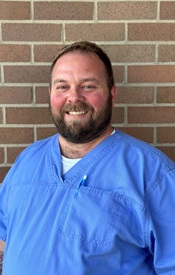
Rachel Louis was recently accompanying her new medication history technician, Seth McKinney, to his 30-day review when she had an unplanned demonstration of how well McKinney handles the unexpected.
"We were walking from the emergency department back to my office,” recalled Louis, the clinical pharmacy services supervisor for UofL Health in Louisville, Kentucky. “As we got to the entrance of the building, we noticed people trying to get an unconscious family member out of their vehicle.”

McKinney quickly went over to assess the unconscious man while Louis called for a code team.
McKinney, relying on his cardiopulmonary resuscitation (CPR) training, first tried to rouse the unconscious man by calling his name and performing a sternal rub.
“Then I kept feeling for a pulse. And I found it, and then he lost it,” McKinney said. “I did CPR for approximately forty-five seconds to a minute, and then noticed that he moved.”
After confirming that the man had regained a pulse, McKinney resumed the attempts to rouse him until the code team arrived a few minutes later.
McKinney said he’s participated in code responses while working as a patient care technician in hospital emergency departments and intensive care units. But he had never before performed CPR as a bystander — and that’s a very different environment, he said.
“It was odd being one of the only ones around knowing what to do. And then it felt a little scary, because I didn’t have any of the tools, I didn’t have an ambu bag,” he said. “All I could do were compressions while waiting on the hospital code team to get there.”
He said the people who were with the unconscious man mostly spoke Spanish, so there was a language barrier that affected the response.
“I was trying to get them to just put him straight on the ground right outside of the car, because I didn’t know if he had any injuries,” McKinney said. “They ended up carrying him into the lobby of that building.”
But all ended well, and the man survived the incident, Louis said.
Louis said all of her medication history pharmacy technicians are required to complete basic life support (BLS) training because they work directly with patients. She said McKinney, with his past experience in critical and emergency care, was well-suited to handling this emergency.
“I felt comfortable having him in charge,” Louis said. “He did all the right things. I would just like to applaud him for his quick thinking, his quick response, and his calm under pressure.”
McKinney said having BLS training, and being able to trust that training during an emergency, is invaluable for any healthcare professional — and for the general public as well.
“Everyone should have at least some exposure to that type of training as bystanders. Because you never know what’s going to happen,” he said.








